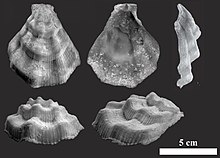This article has multiple issues. Please help improve it or discuss these issues on the talk page. (Learn how and when to remove these messages)
|
| Swiftopecten djoserus Temporal range: Late Pliocene PreꞒ Ꞓ O S D C P T J K Pg N ↓ | |
|---|---|

| |
| The holotype specimen of Swiftopecten djoserus (Yoshimura, 2017) from Toyama Pref., Japan, owned by National Museum of Nature and Science, Tokyo (No. PM27195). | |
| Scientific classification | |
| Domain: | Eukaryota |
| Kingdom: | Animalia |
| Phylum: | Mollusca |
| Class: | Bivalvia |
| Order: | Pectinida |
| Family: | Pectinidae |
| Genus: | Swiftopecten |
| Species: | S. djoserus |
| Binomial name | |
| Swiftopecten djoserus Yoshimura, 2017 | |
Swiftopecten djoserus '(Yoshimura, 2017) is an extinct species of bivalve belonging to the subclass Pteriomorphia and family Pectinidae that lived during the Late Pliocene, approximately 2.75 Ma. Their two valves have step-like growth ribs.
Origin of scientific name
The species name comes from the Pyramid of Djoser in Saqqara, Egypt; the commarginal constrictions of Swiftopecten djoserus resemble the unique stepwise form of this pyramid.
References
- Yoshimura, Taro (2017). “A New Pliocene Species of Swiftopecten (Bivalvia: Pectinidae) from the Zukawa Formation in Toyama Prefecture, Central Japan”. Paleontological Research 21 (3): 293–303.